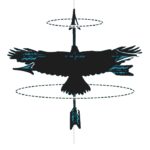I set out to do something brave, so I called my mother for a real conversation. She let me talk about nothing, but she was honest when she thought I needed it. When I was dumped recently, she didn’t give me any I-told-you-so’s, but she told me she’d known all along my boyfriend preferred larger women and was kidding himself with me. “You can’t change what a person likes, Jo,” Mom said. “That’s a sad truth about the world.” She always told the truth but not spitefully.
I wanted to talk to Mom about her ex-husband, Larry, my dad, who was coming to visit me in two weeks. I didn’t know him well anymore, if I ever had, and though he’d been a good parent (funny, stable, heartfelt), I couldn’t remember anything specific about him. They’d divorced when I was young. Eleven. Dad was abstract good feelings, something about sweaters, eating food in restaurants that didn’t exist anymore. I remembered only two precise things about him: his Garfield tie and a cedar chest he packed full of wool blankets to take to his new condo in Minnesota.
I dialed Mom’s number, and while the phone was ringing, I prepared. I don’t think of myself as noncommittal, but I am. “Tell me something specific about Dad,” I said after we’d moved through the pleasantries. “Do you remember a particular day?”
“He could never play the guitar, Jo,” Mom said. She didn’t hate him. He might have been her one great love, but stability made her crazy. Five years ago, Mom sold her house and started moving to a different dwelling each year: a haunted houseboat, a lighthouse with no potable water, a 150-square-foot apartment in a converted firehouse. Her contrived eccentricity was annoying, but at least she was honest with herself. I could live in the same neighborhood forever, but I didn’t like admitting it. I knew I’d disappoint Mom if I told her how much I needed routine, like I was siding with the dad I couldn’t remember.
“I had filthy habits, cleaning-wise, and he wanted to buy a townhouse,” she said. “So, you know.”
“I know all that,” I said.
I could picture her looking off into the Tarzana hills, thinking seriously. She and six other middle-aged free spirits lived in a crumbling farmhouse with beehives in the walls. Her living situation couldn’t be more predictable. She once told me the regularity of her wanderlust scared her, but she knew she was too old to figure out a new way to be adventurous. “OK,” she said. “Here’s a completely ordinary Saturday. We woke up. I did the dishes with him for twenty minutes, then we watched Twin Peaks on VHS. He taped it. You woke up late, and we went to breakfast. At Shelly’s, that creepy place. Dad told you about sex. Nothing graphic. You were in the sixth grade.”
“At the restaurant?”
“Yeah. Some woman gave us the stinkeye about it, but it was harmless, love and marriage and all that bullshit. We came home, and I read a book about somebody who was obsessed with gardening. I’ve always wanted to be obsessed by something but I’ve never been that lucky. Dad cleaned the gutters. It was fall. Later, you went to a sleepover. I drove you. You said, ‘I hope Lacey isn’t there,’ but she was. I picked up chicken from the store. I looked at the soaps they had, as a kind of symbolic gesture, but they all were made with palm oil. I bought Dad a piece of peanut butter candy. You remember that candy he liked?”
“No.”
“I don’t remember what it was called. We went home and ate the chicken and watched Poltergeist. Dad taped that too. It was too scary for me, so he kissed me to calm me down, and while we were making out on the couch, I thought two things: I want to leave Larry, and we need a new couch. It was too scratchy.” She paused, swallowed. “You wonder if thinking something means it should happen.”
“It does, right?” I said. “You left him.”
“Sure, but not until two years later. We could have stayed together, probably. Anything can be negotiated.”
“Don’t you still have that couch?”
She laughed. “I do. It’s OK. Mostly collects coats.”
I couldn’t think about that poor, unloved piece of furniture. She’d forgotten to dislike it, hadn’t had time to search for something better. Maybe relationships were like that, maybe people were like that. I wanted to say something to make Mom think differently about karma and purpose and absolutes. I wanted to prove to her that choices matter. But I couldn’t. After all, the couch is different from how it was back then. Smoother, less scratchy, from where everyone’s spent time sitting.
—
Alicia Bones is a Seattle-based writer and college instructor. Her work has been published in Fairy Tale Review, Necessary Fiction, Queen Mob’s Teahouse, Qu, and Maudlin House, and is forthcoming in Paper Darts.
Artwork by: Sara Lightning
Sara Lightning is a painter from Denver, Colorado, currently living and working in Budapest, Hungary. Her paintings primarily focus on the figure in various states of abstraction, often collapsing pictorial space between the figure and the environment. Her approaches range from creating visual intersections between people and architecture to using patterns as a grounding device against which gestural iterations of the figure are overlaid.
Links
Website: saralightning.com
Instagram: @saralightningart

